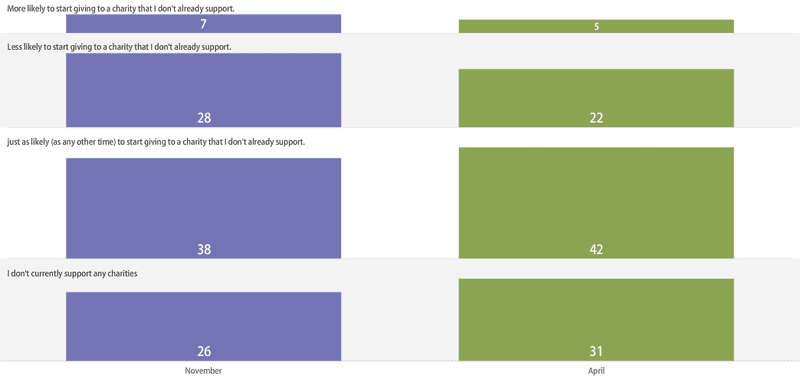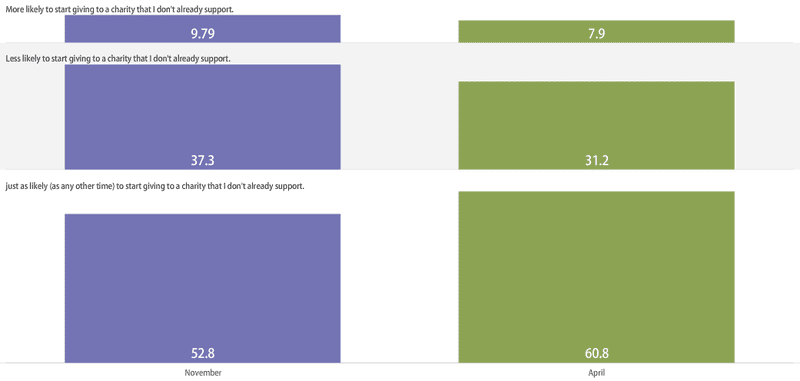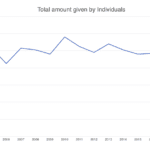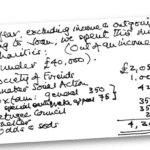The recession is hitting home for some donors – but not all of them
Back in November, a number of the key indicators were showing that the main impact of the economic downturn would be on donor recruitment.
As a result, Bluefrog commissioned a survey that specifically asked people about their attitudes to giving to charities that they didn't currently support.
An analysis of the findings can be seen here, but in short, we discovered that 37% of donors said they were less likely to give to a new charity.
We promised that we'd repeat the survey and last week we asked almost 2,000 people about their thoughts on this aspect of their giving behaviour.
So what did we uncover?
The simple answer is that the number of donors who are less likely to give to a new charity now stands at just 31%.
That might sound like good news, but when we look at the whole sample (donors and non-donors) we find that the number of people who are not giving to charity has grown from 26% to 31%.
 Doubt has been replaced by certainty in many people's minds. And the result is that the economic situation seems to be polarising attitudes to giving – though some people have decided to stop donating, there is very good growth in the number of donors reverting to their traditional giving patterns and a small, but significant number, still intend to give more.
Doubt has been replaced by certainty in many people's minds. And the result is that the economic situation seems to be polarising attitudes to giving – though some people have decided to stop donating, there is very good growth in the number of donors reverting to their traditional giving patterns and a small, but significant number, still intend to give more.
Digging a little deeper, we can see how different age groups and social classes are responding to the downturn:
Younger people seem to be most pessimistic about their economic position
- 43% of people in the 25 – 34 age group now don't give to a charity (up from 33%).
- 34% of people in the 25 – 34 age group will give at pre-recession levels (down from 38%).
Older people are continuing to give
- Both the 55-64 and the 65+ groups contain just 19% of people who are not currently giving.
Women are more generous
- There was an 8% fall in the number of women less likely to give support (down to 23%).
- 7% of women are likely to give more (compared to 4% for men).
Though the number of wealthier people not giving increased by 25%, those keeping their giving constant held firm at 51%
- The number of AB's not giving to charity rose from 15% to 20%.
But what does this mean in practice?
When I look at results for a whole range of organisations that Bluefrog is working with – from Barnardos to SPANA and from Shelter to VSO – income and response rates have been outstanding.
Recruitment has sometimes been tough, particularly that of younger donors (where increasing early attrition is a major problem), but well constructed and targeted appeals that value and engage the donor are working well.
The results of this, and a whole range of other research exercises can't be ignored. The economic impact is hitting home for some – but we must remember – it is only some. Huge nembers are still giving.
My advice, based on reviewing over six months of recession busting activity is to:
- Concentrate on being positive in appeals. People will give to good work
- Don't be frightened of mentioning the recession if it has a direct impact on your work (e.g. the impact of falling exchange rates on overseas development)
- Treat the donor as an individual. If you make them feel special, they are likely to return the favour – hand writing, stamped envelopes and real photographs will beat over-designed work
- Concentrate on what the donor can do – avoid whittering on about policy issues. These might be important to you – they aren't to most donors.
- Look at your data – regularly! If people aren't responding to your appeals, call them up and offer them a break or sign them up to a direct debit (restricted for the length of the downturn).
- Take advantage of cheap media and production and recruit new supporters. There are some fantastic bargains available. And people who give at this time are going to be very good long-term prospects.
-
Develop engagement materials – not simple newsletters or leaflets – for recruitment aimed at younger people (e.g. face to face techniques).
I'm not sure if we will repeat this piece of research. If there is major movement in the economy we will, but the results that are most important for us to look at are those that are in response to our appeals.
The survey of 1,994 people was undertaken by Ipsos Mori. Fieldwork took place between 17 and 23 April 2009.










